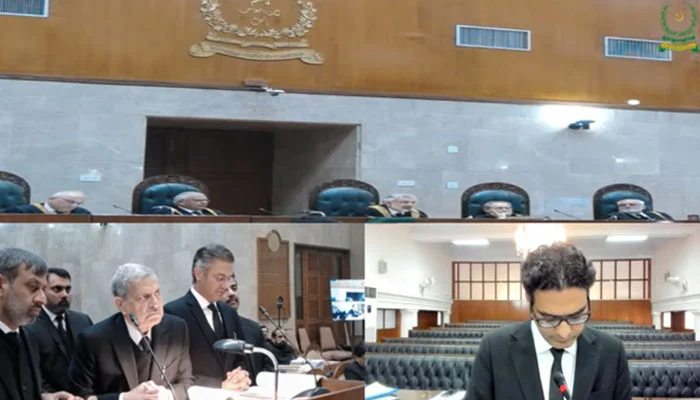ISLAMABAD: In response to an appeal by former Islamabad High Court judge Shaukat Aziz Siddiqui contesting his removal from the position, the Supreme Court postponed its decision on Tuesday.
Proceedings on the plea were held by a five-member bench consisting of Justice Amin-ud-Din Khan, Justice Jamal Khan Mandokhail, Justice Hasan Azhar Rizvi, and Justice Irfan Saadat Khan, under the leadership of Chief Justice of Pakistan (CJP) Qazi Faez Isa.
Following the verdict’s reservation, CJP Isa ruled out the order for today’s open court proceedings.
The written ruling asked the parties involved in the case to address issues brought up during the court hearings.
The SC also questioned if the SJC carried out an investigation in the order.
“What would happen if the investigation wasn’t conducted in accordance with the law and the Constitution?”
The former judge has already attained the age of superannuation, which is June 30, 2021, as per the court’s ruling mentioning his date of retirement.
The SC posed the following queries in its order:
Should Shaukat Siddiqui’s appeal be granted, what kind of relief would be granted?
Is it possible for the Supreme Court to return the case to the Supreme Judicial Council?
If council action is not necessary, is the judge’s speech itself not in violation of the code of conduct?
The parties were given three weeks by the court to turn in their responses to the aforementioned inquiries.
It said, “The Supreme Court may take further judicial action if necessary.”
Observing
In the case involving the dismissal of former judge Siddiqui by the Supreme Judicial Council, CJP Isa stated at the case hearing that the content of the speech is the issue rather than the speech itself.
Half of the judiciary will return home if a judge is ousted for making a speech, said the chief justice.
“Judges frequently speak at bar council gatherings. The speech itself is not the issue; rather, it is the speech’s text,” he said.
“A judge is not prohibited from speaking by the code of conduct. Making demands in your discourse is the issue, CJP continued.
The nation’s highest court made these comments as the hearing on the former judge’s plea contesting his dismissal resumed.
Live broadcasts of the proceedings were available on the website and YouTube channel of the Supreme Court.
In the case, Khawaja Haris is defending former Inter-Services Intelligence (ISI) director general Lieutenant General (retd) Faiz Hamid and Brigadier (retd) Irfan Ramay, while attorney Hamid Khan is representing the former IHC judge.
After the judge filed a miscellaneous application with the Supreme Court to have an early hearing of his plea against the Supreme Judicial Council’s (SJC) decision to remove him, the matter was scheduled for hearing earlier this month.
According to the chief justice, justices participate in American discussions and conduct interviews in Britain.
“Everyone in the country is watching us.” The top justice questioned what ruling the bench should make in such a situation, saying, “This is the question of respecting the constitutional institutions.”
Judge Mandokhail questioned if Siddiqui’s level of claims was proper for a judge to make.
The CJP answered, “We should not forget the facts.”
“If the allegations are true, was Shaukat Siddiqui’s procedure as a judge appropriate?” inquired Justice Mandokhail.
The chief justice declared that the judge’s expression is unrestricted. “Many judges would not have heard the speech if this were the case. The issues are those that Shaukat Aziz Siddiqui brought out in his address.”
He questioned if the court could look at the situation directly. “Can the Supreme Judicial Council case be constitutionally remanded?”
Gen (retd) Hamid and Ramay’s attorney responded to CJP Isa by saying that the case could not be sent to the SJC.
He declared, “Shaukat Aziz Siddiqui is retired and cannot be reinstated as a judge,” therefore it was no longer possible for the SJC to investigate his case.
When CJP Isa questioned the attorneys for Lt Gen (retd) Faiz and Brig (retd) Ramay about whether they agreed with the accusations made against them, Haris said that his clients disagreed.
The former SC registrar has filed a reply in the case, according to the CJP.
He questioned if the court could look at the situation directly. “Can the Supreme Judicial Council case be constitutionally remanded?”
Waseem Sajjad, an attorney, was representing former IHC Chief Justice Anwar Kasi, whereas Mansoor Usman Awan, the Attorney General for Pakistan, represented the federation.
Siddiqui’s attorney argued that since Lt Gen (retd) Faiz is disputing all of his client’s accusations, the SJC ought to have looked into the case.
Since this is our matter, the Supreme Judicial Council ought to have looked into it first. We would have had the chance to cross-examine him during the investigation,” he stated.
The CJP questioned the additional attorney general for Pakistan, who was present in court before the AGP, about whether an investigation had been done.
“No investigation was done when Shaukat Siddiqui accepted [the speech’s content].”
After mentioning that the facts were not looked at, the extra AGP asked for recommendations on the case.
Demanding the formation of a judicial committee to look into his client’s statement, Siddiqui’s attorney, Khan, stated, “Declare the Supreme Judicial Council’s action illegal.”
The CJP questioned the lawyers, “How and under what law should the Supreme Court order the creation of a commission?”
In addition, he wondered what would happen if Siddiqui’s accusations turned out to be untrue. “How can we determine who is telling the truth and who isn’t?”
CJP Isa stated that the Supreme Judicial Council should follow the law in all of its actions.
conditions weren’t met by the council’s decision. In these conditions, how is the Supreme Court able to render a decision?
AGP said that it is incorrect that Siddiqui’s claims have not been looked upon. If the accusations are untrue, he continued, the judge should also face consequences.
The AGP stated, “The decision of not taking action after the judges’ retirement in the Afiya Sheharbano Zia case has been challenged.”
He went on to say that if the ruling in the Afiya Zia case is maintained, Siddiqui could be labeled retired rather than fired.
“The Shaukat Aziz Siddiqui case is entirely within the purview of the Supreme Court to decide.”
The parties have agreed that a thorough investigation has not been carried out in this case, as noted by CJP.
“It is against established legal requirements to remove Shaukat Aziz Siddiqui without conducting an inquiry,” the AGP stated.
He also said that if the ruling in the Afiya Sheharbano case is overturned, the issue could go before the council.
The AGP declared, “A judge cannot be removed without an inquiry; this is a matter of fundamental right.”
The former intelligence chief and others were to be named in the plea against his dismissal by retired judge Siddiqui, the highest court said during the case’s final hearing on December 14, 2017.
IHC judge dismissal
It should be mentioned that the former judge’s remarks against intelligence agencies during his July 21, 2018, speech to the Rawalpindi Bar Association resulted in his removal from the IHC.
During his speech, the former judge charged delicate establishments with meddling in legal matters.
Subsequently, he faced several references, including one demanding his dismissal for remarks he made during the hearing of the Faizabad sit-in case in 2017, another relating to additional expenses for government housing, and one that the SJC investigated after receiving a complaint about him after the speeches.
The SJC ultimately voted to fire him, and on October 11, 2018, he was finally removed from his position.
The judge subsequently appealed the SJC’s decision to fire him in 2018, and his case has been pending ever since. The constitutional petition’s most recent hearing is scheduled for June 13, 2022.
In his petition, Siddiqui asked to have the notice of his dismissal as an IHC judge revoked.
Senior attorney Hamid Khan is defending the judge; the Islamabad Bar Association and the Karachi Bar Association are parties to the petition.







